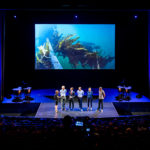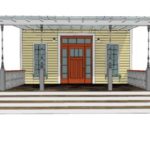
At first glance, it seems a little counterintuitive, one of the world’s largest oil and gas companies sponsoring a competition for students to engineer and race the most fuel-efficient vehicle possible. But it’s an annual tradition Shell has kept going for 30 years, beginning in France in 1985; adding a second event, Eco-marathon Americas, in 2007; and a third, Eco-marathon Asia, in 2010.
This year’s Shell Eco-marathon Americas drew more than 113 high-school and college teams from Brazil, Canada, Guatemala, Mexico, and the United States to Cobo Center in Detroit on April 9–12. (Convene was also there, hosted by the Detroit Metro Convention & Visitors Bureau.) The more than 1,000 students spent most of their 72 hours readying their vehicles for a tough technical inspection by Shell (there are a number of strict safety standards the vehicle must meet), tweaking any problems, then finally setting off along a .9-mile track set up downtown, on Jefferson, Woodward, and Michigan avenues. The University of Toronto’s Supermileage Team 2 won the gasoline prototype category, with a vehicle that got 3,421 miles to the gallon.
Although the primary purpose of Shell Eco-marathon is to give students a chance to turn their engineering knowledge and education into a real-life, sellable skill set, the event is open to the public, and aims to keep the global energy conversation moving forward. “This is our flagship event this year for Shell,” Pamela Rosen, general manager of Shell Eco-marathon Americas, told Convene during a break on the second day of the event. “For us, Shell Eco-marathon is a visible demonstration on how we’re helping support and facilitate finding solutions to make sure we all have energy in the future.”
TRAINING FUTURE INNOVATORS
For participating students, Shell Eco-marathon offers a chance to build something tangible to catch the eye of an admissions officer or rub shoulders with Marvin E. Odum, president of Shell Oil Company, who often stops by students’ paddocks, where teams house and prepare their vehicles, during the event.
“What they learn in academia, where it’s difficult to grasp a concept, all of a sudden, here it is applied,” said Michael Werner, adviser to the ShopGirls team from Granite Falls High School in Granite Falls, Washington. Werner has overseen the ShopGirls for six years, and says that the benefits of the competition go far beyond just gaining experience for a career in mechanical engineering. “It’s the soft skills — finding solutions to problems under stress, representing the school, the city, the state,” he said. “It’s not just technical; it’s about who you are as a person and how you work with others.”
The ShopGirls, who placed fourth out of seven teams in the Prototype Diesel category — for which they also won a safety award — were the only all-female team at the competition. “Before I was planning on going into culinary arts, but since this program I’m going to do mechanical engineering,” said student Teagan Fife, who has been part of the ShopGirls for three years. It’s the same for student Tori Irvin, who decided to join the team this year after seeing them in a town parade. “I came on with little or no engineering knowledge,” she said. “It seemed like a great opportunity. I’ve learned a lot. It’s fun to see all of the different types of cars, how people work together.”
Students can only work on their vehicles in their spare time outside of school, so participation requires dedication beyond the typical extracurricular activity. They also have to drum up their own funding. “They go out and they do all of the hard work,” said Melissa Cantwell, strategic partnerships adviser for Shell Eco-marathon Americas. “They build, design, and test these vehicles, but they also go out and get the sponsors. They’re doing it purely for the love of the competition.”
“For Shell, it’s really all about, how do we get to those future solutions with our partners?” Rosen said. “We’re not going to do it alone. Fast-forward 10, 15 years from now, you’ve got all these future engineers who could very well become the next heads of many OEMs [original equipment manufacturers]. Fond memories of Shell Eco-marathon…. It’s just a good fit, right?”
BETTING ON DETROIT
In 2015, Shell moved Eco-Marathon Americas from Houston to Detroit for a three-year stint. Apart from the city’s deep-seated connections to the auto industry, Detroit offered logistical advantages that many cities couldn’t, including enough space at Cobo Center to accommodate an indoor student campout where most of the teams sleep (affectionately nicknamed “tent city”) and being able to shut down adjacent city streets for the event’s test track.
“The student experience being most important for us, for the students to get an opportunity to test their vehicles in an urban environment, that’s part of the reason we chose Detroit,” Cantwell said. Detroit also has historical and aspirational significance — students race their vehicles on the same streets where Henry Ford beta-tested his first car, the Ford Quadricycle, in 1896. “To watch the students take off down the road and turn on to Woodward Avenue,” Cantwell said, “it gives you chills, because these students are the future of innovation.”
“This is not just a symbolic gesture,” Odum said during “Perspectives on Detroit,” a panel hosted by Detroit Mayor Michael Duggan and Roger Penske, founder and chairman of Penske Corporation. “I think we’re here with real intentions — what we might be able to start here in Detroit.” Penske added: “[Hosting an event like] Shell Eco-marathon is a validation of what is going on here. I want to see young people live here. If we do that, Detroit will be a model city.”



